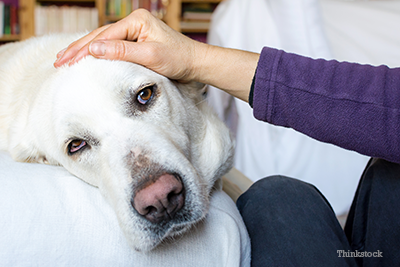How are NSAIDs used in dogs?
Nonsteroid anti-inflammatory medications, also called NSAIDs, are primarily used to treat pain in veterinary medicine. NSAIDs can also be used to treat pain associated with osteoarthritis and post-operative pain in dogs. In addition, NSAIDs are used off-label to lower fevers, decrease inflammation and treat acute pain.
 What are the potential side effects of NSAIDs?
What are the potential side effects of NSAIDs?
NSAIDs are the most frequently prescribed analgesic (pain medication) in dogs. NSAIDs are effective, but like all medications, certain side effects can occur. Some are mild and resolve spontaneously, while others are serious and even life threatening. The most common side effects are:
Serious side effects may include:
- Gastrointestinal ulcer
- Gastrointestinal perforation
- Liver toxicity
- Kidney toxicity, kidney failure
- Death
It is important to realize adverse side effects can happen after one dose, many doses, or may never happen. Dogs are individuals, like us humans, and react uniquely to different medications.
Why is it important to screen before prescribing NSAIDs?
The best way to minimize the risks of adverse side effects is to screen dogs for risk factors. Before prescribing NSAIDs, your veterinarian will get a thorough history and perform a complete examination to determine if your dog has any contraindications for NSAID use, such as pre-existing conditions or medications that increase the risk of side effects.
In addition, your veterinarian will obtain blood work to look for pre-clinical disease. Kidney disease, for example, often does not show outward signs until the patient has lost two-thirds of kidney function. That's why blood work is so important! Blood work allows your veterinarian to evaluate for pre-existing diseases before the signs and symptoms become evident so that they can determine if your pet is a good candidate for NSAIDs. [Click here to learn more about kidney disease in cats.]
How do I monitor my dog on NSAIDs?
Just as important as screening, once your dog has started NSAIDs, your veterinarian will likely recommend re-checking your dog’s blood and/or urine on a regular basis. Routine monitoring allows your veterinarian to ensure that your pet is tolerating the medication without developing adverse effects. All NSAID manufacturers recommend baseline blood work as well as periodic monitoring to minimize the likelihood of serious side effects.
What can YOU do to make NSAID use safer for your dog?
1. Learn to recognize potential side effects
Become familiar with the potential side effects of NSAIDS. If you notice any side effects or issues after starting your dog on NSAIDs, be sure to STOP the medication immediately and call your veterinarian.
2. Keep NSAIDs out of reach
Sadly, one of the most common reasons for NSAID-related side effects is overdose. Many of the veterinary-approved NSAIDs are flavored to make them easier to administer. Unfortunately, this also makes them enticing to pets that may eat all of them if they get ahold of the bottle.
3. Bring your pet to the vet for regular monitoring
Regular checkups and monitoring blood work are important because they allow your veterinarian to look for potential side effects before they become more advanced. Early detection allows your veterinarian to discontinue the NSAID before any serious adverse events occur.
4. Report any and all side effects
By reporting any adverse side effects to your veterinarian or the FDA, you are helping the FDA in their ongoing efforts to monitor drug safety. The FDA monitors adverse side effects and can modify the label or even recall a drug based on safety concerns.
The majority of pets treated with NSAIDs experience improved comfort and quality of life. It is important to remember that, like all medications, NSAIDS have potential risks. Be sure you work with your veterinarian to make sure your pet is a good candidate and is monitored regularly to ensure they are tolerating the medication and not developing any adverse side effects.
For more information
Questions for your veterinarian:
- When would you like my pet to come in for a recheck and monitoring blood work?
- How quickly do NSAIDs work?
- Is there anything else I can do for my arthritic pet?
If you have any questions or concerns, you should always visit or call your veterinarian -- they are your best resource to ensure the health and well-being of your pets.

Dog Kidney Disease Articles
Chronic Kidney Disease: What Does Kidney Failure in Dogs Really Mean?
10 Common Causes of Kidney Disease in Dogs